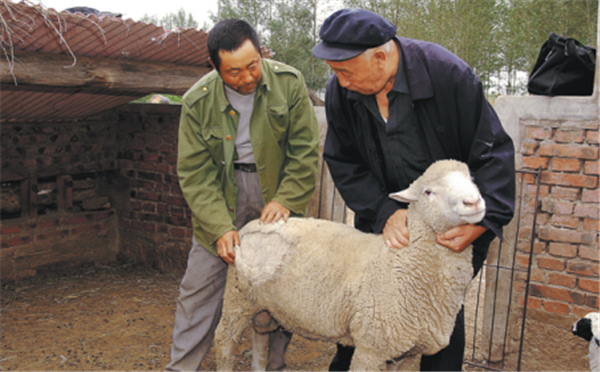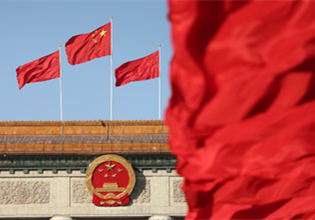Veterinarian, 89, has helped farmers beat poverty for decades
Editor's note: As the Communist Party of China celebrates the 100th anniversary of its founding this year, China Daily talks to CPC members whose service to the nation and the people reflects the Party's spirit.

Wu Handing (right) treats a sick sheep at Qingshuihe county in Hohhot, Inner Mongolia autonomous region, in September 1988. CHINA DAILY
Wu Handing is a household name in Qingshuihe county of Hohhot, the capital of North China's Inner Mongolia autonomous region.
For several decades, the 89-year-old veterinarian has been putting his heart and soul into efforts to help the poverty-stricken people in the county.
The Yellow River flows through the county, leaving behind infertile soil that can't support good farming. As a result, during the worst period in time, more than 90 percent of the county's population lived below the poverty line.
In 1986, Qingshuihe was on the nation's first list of poverty-stricken counties.
Sixty years ago, Wu, a native of Qingshuihe, was sent to the county, where livestock diseases were spreading. Many farmers were reduced to poverty overnight when their livestock was infected.
By night and day, Wu stayed at villages in the county, helping to bring sheep and cattle diseases under control.
While visiting with farmers from village to village, Wu found that local farmers could hardly make ends meet. They didn't have enough food or clothes.
"At that time, I committed myself to helping these people get rid of poverty," Wu recalled.
The first step he took was to improve the breed of sheep raised in the area. He tried hard to raise money to buy high-quality sheep as well as more than 500 donkeys, and he improved local sheep stock through artificial insemination.
In two decades, the mutton and fleece in Qingshuihe county greatly improved, and the farmers had more income.
In 1982, Wu was promoted to director of Qingshuihe county's veterinary station, a move that transferred him from being a part-timer to becoming an employee on the government payroll, which for many local people is a long-cherished goal.
But Wu made a decision that surprised everyone. He resigned from the director's post after just three years, though he remained with the bureau, because he wanted to pursue a larger mission.
The second part of his strategy to help local farmers was to improve their way of farming. They did extensive cultivation with poor yields and harmed the environment.
Wu met with misunderstanding from his family, and even the local farmers had their doubts, wondering what Wu could do without money or government support.
"Actions speak louder than words," Wu said.
With their dry land on the slopes of hills, the farmers lived at the mercy of the weather.
Wu persuaded them to move from the hill areas to the ridges, where there was better land for farming and for possibly solving problems related to electricity, water and roads.
His first target was Qingshuihe county's Nuanshuiwan village, where every family lived without electricity or water.
Wu visited Luliang, Shanxi province, to learn how to undertake high-yield farming. He also leased a piece of land in the village of Nuanshuiwan to show the local farmers what he learned.
The good harvest from Wu's land was most persuasive. Following in his footsteps, the farmers planted grass, raised sheep and grew high-yield crops. They had a good harvest.
Then Wu told the villagers to take a new approach to cultivation by setting aside one-third of the slopes for planting high-quality forage grass, one-third of the land for growing cash crops, and the rest for intensive farming.
Wu's style of cultivation worked. The local farmers' average income increased from 113 yuan ($17.53) in 1987 to 6,200 yuan in 2008. The changes in the village, which now has electricity, water and roads, are known to all locally. All the villagers have moved into stone cave dwellings-unique houses that are very common in the Loess Plateau in Northwest China.
Wu retired from the Qingshuihe county's animal husbandry bureau in 1992. But his efforts to help poverty-stricken farmers continued. He introduced new brands of grains and new technology to farmers, helping more than 12,000 people shed poverty.
He also sets aside one-third of his pension to help poor students, the elderly and people with disabilities.
In 2018, Qingshuihe county was removed from Inner Mongolia's list of poverty-stricken areas, and Wu was recognized as a model in China's fight against poverty.
Wu's son, Wu Bin, 67, said his father is also a role model for the family.
"At first we didn't understand why he was so devoted to helping those villagers," his son said.
Not only had the veterinarian gained a sought-after post and important title in the poor rural areas, but he had a good, stable income. Yet his family was living paycheck to paycheck because he was so generous in helping others.
Wu Handing, who joined the Communist Party of China in 1978, has been committed to doing his best for the country.
"When we gradually came to know what he does, we stood behind him," his son said.
The veterinarian was among the 400 outstanding Party members to be commended this year by the CPC Central Committee.



 Print
Print Mail
Mail





